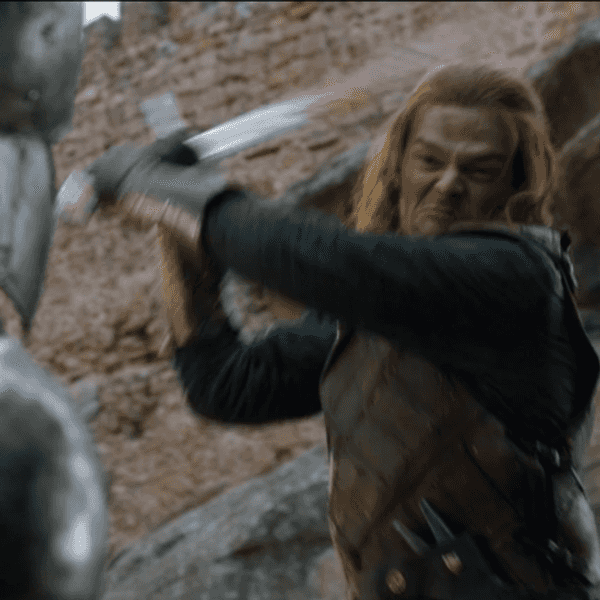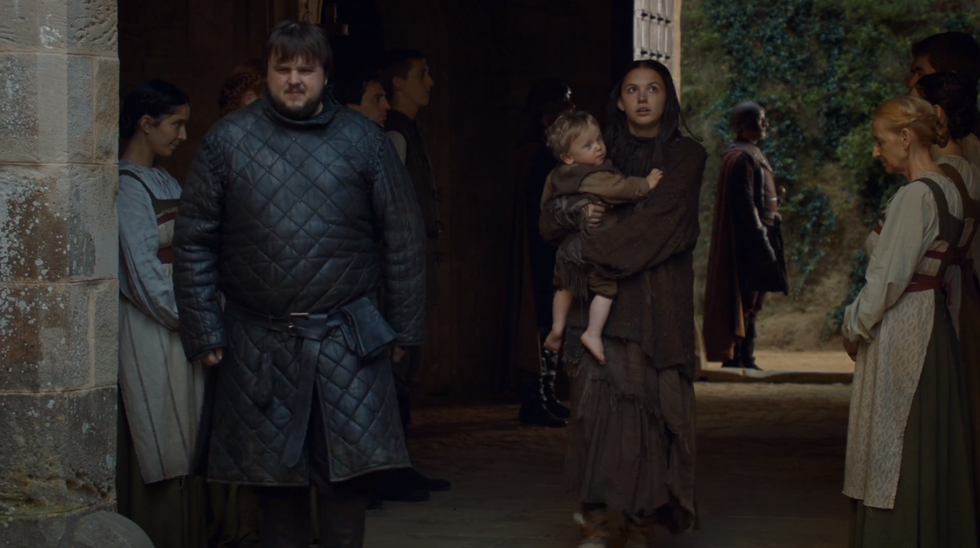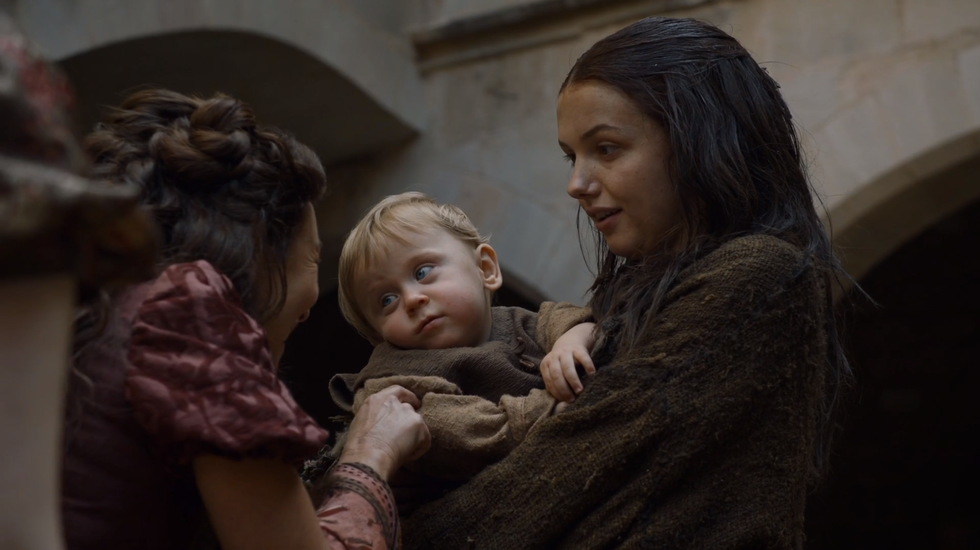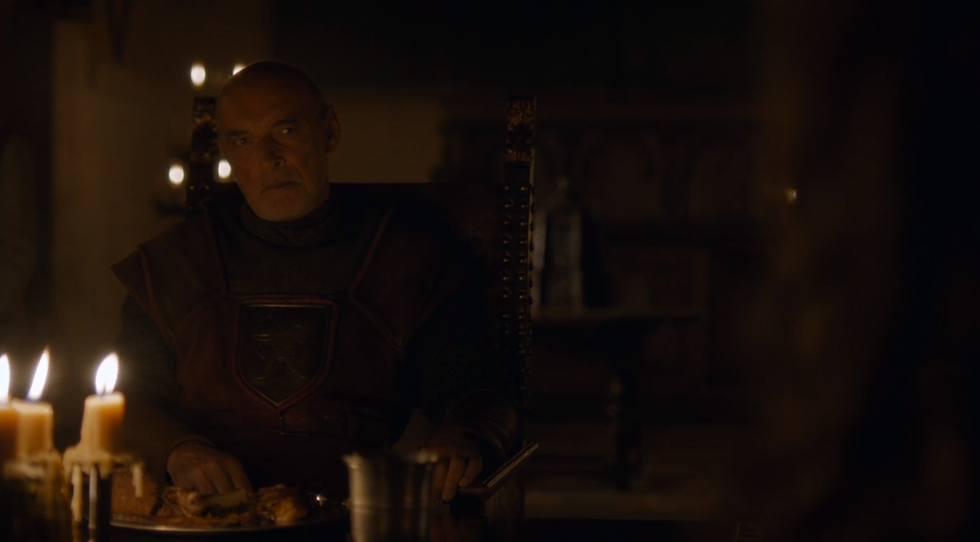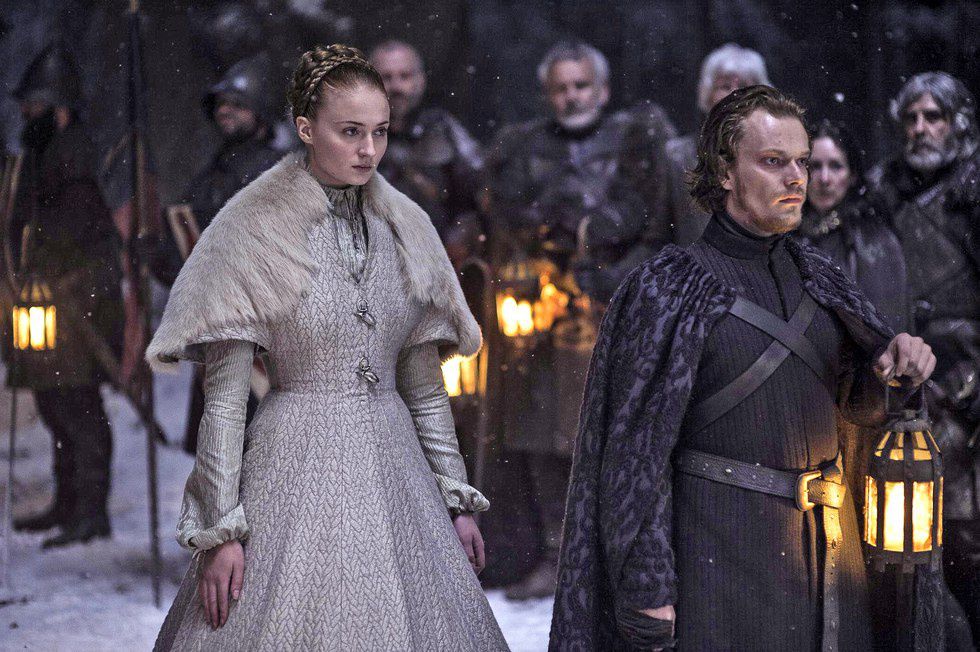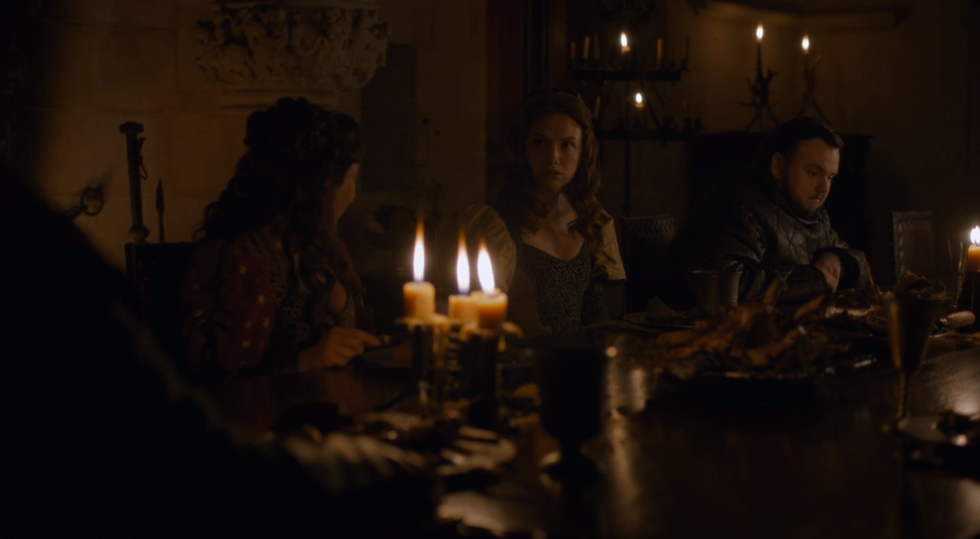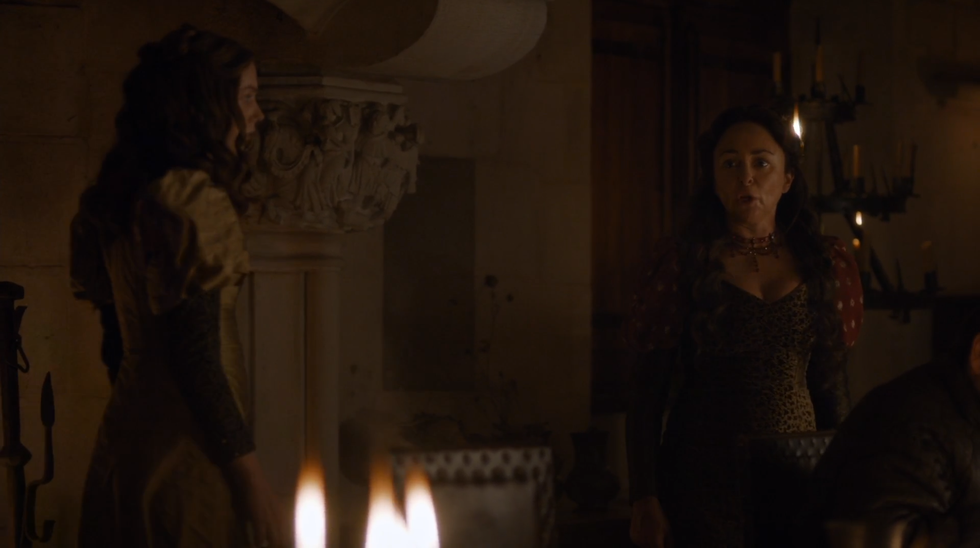The term “historical realism” is a term that is constantly applied to our media, mostly in retaliation to backlash against violent or upsetting subject matters, and it is frankly being abused. It’s a term that has started to come hand in hand with the “gritty drama” genre, especially the television shows that are being heralded as shocking because they show us the “hard truths” of life. Shows that are applauded for not shying away from the unsavory aspects of our world are some of the top shows on television at the moment. One of the most critically acclaimed of the bunch is HBO’s Game of Thrones. The novels of which it is based upon are set in a medieval-esque patriarchal society and the author, George R.R. Martin, uses this lens as an exploration of a misogynistic world, breaking down gender roles, and examining the cultural and personal effects living in this type of an institution can have. However, the show doesn’t explore this. Or at the very least, it only explores it when it wants to. If you're going to claim “realism," however, as reasoning for showing upsetting violence and situations, then this “realism” needs to be a constant that is explored and challenged within the world and story itself. As evident from last week’s Episode 6 of Season 6, the writers of Thrones are in no way interested in exploring the “realism” of a patriarchal society as a commentary, but would rather exploit the term to justify scenes of upsetting nature to fill their shock quota.
Last week’s episode of Thrones found our characters of Samwell Tarly and Gilly arriving at the Tarly family home of Horn Hill. They are immediately greeted by Sam’s incredibly sweet mother and sister, who gush over Gilly’s child, Little Sam, and tell Gilly how beautiful she is. Now, while Thrones is not one for showing positive female interaction, on the first watch, this seemed to be a breath of fresh air, but when one stops to actually think about the situation for more than a moment, all of that hope seems to fly away and the large cracks in the narrative come to light. The show has never been very good at exploring the classism prevalent in the books, particularly surrounding the casualties and futility of war. In the novels, we are shown a war torn Riverlands and the price the small folk had to pay for a war that had nothing to do with them. There is support all over from the small folk for the rise of the Sparrows because they represent their faces in a war that ravaged their lands and people but cared little for who they were. Westeros is a completely classist society and in a show that chooses to adapt the High Sparrow plot and expect its audiences to believe that he’s so untouchable because of the effect he has on the small people, one would think it would be a theme that would remain prevalent. It’s not.
Sam’s mother and daughter, no matter how sweet, were still raised as proper ‘ladies’, meaning they had all the same training under the teachings of a Septa, just as Sansa had. They were taught the common courtesies and ‘pretty words’ that make them presentable at court. As a classist and monarchist society, great houses with great holdfasts and keeps wouldn't give a second thought to the small folk. Even their brand of justice is so indirect that Ned Stark’s notion of refusing to use a headsman to carry out his justice and the Dornish ideal of both peasant and royal children playing together in the Water Gardens are seen as out of the norm. Thus, when Sam writes that he is arriving with a low-born mother of his bastard child, the fact that his mother and sister actually come out to give them a royal welcome is absurd. No matter how nice of people they are, no matter how much Sam’s mother loved her son, they would still look down upon the fact that one; he’s bringing his bastard home, and two; that this low-born woman who is the mother, literally dressed in rags, is coming as well. The reason why Catelyn reacts so venomously with Jon is because it’s not what is to be expected. It’s more likely that most noble lords would be more in line with Robert’s involvement in his bastard’s lives, where he would father one, pay for it, and leave. Martin writes this of Ned’s oddity and Catelyn’s reaction; “Ned brought his bastard home with him, and called him "son" for all the north to see.” It’s just something that wasn’t done and for Catelyn to come home after the war and to find Jon and his wet nurse already settled in Winterfell, before she had even gotten there, was a massive slight felt on her part. Thus, for Sam to not only bring his bastard son home, but the low-born mother of said child, and for Sam’s mother and sister to greet it with such feverous excitement and welcome doesn’t fit in this “realistic” and classist society. Sansa and Catelyn’s reaction to Jon are the feelings most noble lords and ladies would have towards a bastard child being brought into their holdfast to be raised. Dorne and Ned Stark are the few exceptions and it’s why they are treated as such. Just look at the reaction Ellaria Sand got when announcing her birth in the presence of all the lords and ladies in Kings Landing. In a family and part of the Kingdom that represents the norm, that is run by Randyll Tarly who epitomes the notion of “classist” and toxic masculinity, the concept that their household would go so beyond the norm, after all we’ve heard from Sam, doesn’t line up. To go on further, Sam’s own sister lends Gilly a dress and this subversion of realism is further extended.
During dinner, Randyll Tarly is everything we think he will be. He’s just as brash, horrible, racist, and cruel. He belittles Sam every chance he can get and speaks over Gilly as if she weren't even there. However, Sam’s mother and sister do not fall in line with his beliefs nor his judgement. Sam’s mother is so angry and frustrated even that she gets up from the dinner table, declaring Randyll’s brutality to be enough. She proclaims “You dishonor yourself,” and walks out with her daughter and Gilly. While the notion of abuse shouldn’t be handled lightly, and it certainly has never been handled well in the past, the concept that Randyll could be so incredible verbally abusive towards his own son and then sit by while his wife shames and reprimands him at dinner is laughable. If a man like Robert Baratheon got so cross with Cersei Lannister, the queen and daughter of the warden of the west, that he would slap her across her face and reprimand her ever time she tries to take charge of a situation, then this version of Randyll Tarly doesn’t make any sense. This is a man who the fandom gives the nickname Randyll “Rape Apologist” Tarly to for his treatment of Brienne of Tarth and his general lack of care or consideration for her personhood, nor the lives of anyone he overruns. He also spats that he originally thought Gilly to be a Mole’s Town “whore,” so why he would shelter that belief and let her sit and dine with him in his great hall, doesn’t make a lot of sense. This is a man who’s pride is not matched and who’s ego and hubris is so high that he can’t bare the thought of a son like Sam inheriting that he’s willing to murder his child to make sure that would never happen. This man wouldn’t sit and listen to his wife, relenting on his dismissal of Gilly and allowing her and her bastard to stay.
Why would he want these representations of further shame he feels by Sam to stay under his roof and dishonor his house? Sure he’s not saying they would get the royal treatment, but judging by the influence Sam’s mother has, it’s a wonder she was not able to get Randyll to lessen his abusive behavior towards a son she so loved. In the books, it’s suggested that despite her love for Sam, there was nothing she could do. This man takes the patriarchy seriously and is the type of man who would implement it in full force. His notion of sparing his wife’s feelings would be to tell her Sam died in a hunting accident rather than the obvious answer that he killed his own son. If he cared so much for her, why would he send her son away and treat him so? Why would he not further dent his pride and allow Sam to just become a maester? The man who forced Sam to choose the Watch over death and the man who relented and allowed a Wildling and bastard of the son he hates to stay in his home are two different people. They don’t align with one another and the latter of which would certainly not exist in the ‘realistic’ interpretation of Westeros’ patriarchy.
This past year, Bryan Cogman, writer of said episode, commented on the backlash the show received for the Sansa rape story line from the past season. In the audio commentary section of the DVD’s Cogman said;
“That said, when we decided we were going to do that we were faced with the question: If she’s marrying Ramsay, what would happen on her wedding night? And we made the decision to not shy away from what would realistically would happen on that wedding night with these two characters, and the reality of the situation, and the reality of this particular world.”
If they can hide behind the notion of Sansa’s wedding night being the “reality of the situation” then they have to keep it consistent. The creative team’s response to the backlash regarding that specific plot line was always to site the fact that they are representing the medieval realism of the world. They claim that they wanted to show it because it’s evocative of the fact that rape in a marriage bed is still rape, and that the type of man Ramsay is would be the man who would rape his bride. But, if you are going to literally move mountains to make that plot happen and continue to move said mountains when it involves violence against women, specifically of a sexual nature, then you need to explore said mistreatment on every level.
If you aren’t going to properly explore it, then you don’t need to set this fantasy story that includes ice zombies and dragons in a world that is also sexist and highly patriarchal. If you are choosing to filter the story through that lens, you must do so with reason and intent. When you do it like Martin does it, setting it in that world specifically to challenge us as a people and our culture, it’s a good thing. It improves the thematic and emotional relevance of the story, while commenting on a issue still present in our culture, all the while allowing the very notion of the patriarchy to come out in every facet of the world. The show doesn’t handle it that way. Rape is basically one of the few horrific things they constantly show out of “realism” but then never show the other realistic atrocities of said world with the same fervor. Things that Martin always mentions like dysentery and disease, the realities of any world that’s not technologically advanced, are absent from the show runner’s concept of “realism.” Sexual violence is the only kind of punishing hardships women faced that they decide to show because the other one’s are not “attractive exploitative realism”.
It’s a constant misuse of the term as well. Their patriarchy disappears and reappears whenever they have a need of it. In a world where Sansa’s wedding night must be a reality of the situation, how is a woman like Talisa running around as a field nurse? How does Olenna basically run the Tyrell household and hold a seat on the Small Council. It’s also the same Small Council that discredits Cersei’s rightful place on it for being a woman. A Council that made it hard for her to assert her position as Queen Regent previously. When it gets to this level of inconstancy, it’s not saying something about a patriarchal medieval society. We’re not getting the same exploration of Cerise’s own internalized misogyny and Jaime’s disparity as he deals with losing his sword hand, the part of him that people respected in this toxically masculine society. They can’t site “realism” as an excuse anymore if they aren’t going to follow up on it on all accounts. Then what is the point? It’s also not just their constantly disappearing and reappearing patriarchy and sexism. Just take a look at Tyrion’s alcoholism. It’s a joke played for laughter rather than a serious condition that is effecting him. Just look at the lack of exploration of the toxicity of the incestuous relationship between Jaime and Cersei, two people who are not only so incredibly effected by this patriarchal world and their station, but also the taboo concept of incest. While in the book, Cersei’s lust for the power and agency she is not allowed begins to drive her mad, Jaime starts being cognizant of the purely toxic nature of their relationship and the man the world has shaped him into. He takes an active step in trying to correct that, to be known as something other than ‘Kingslayer’. These characters are not being shaped from the story being told. In the same episode mentioned above, the two share an intimate moment, insisting to one another that they are the only ones in the world that matter. That might sound familiar because we've already heard that same sentiment expressed by these two this season, but also because it reinforces the fact that Jaime has not changed from the Jaime who pushed a child out of a window proclaiming "The things I do for love,” back in season 1. Where is his character growth? Where is the most astounding piece of character work Martin did in his novels, taking a man we despise and turning him into a fan favorite as he rides along his reluctant hero's journey, attempting to reclaim his personhood and redeem himself? The man that wants to make a knightly and noble name for himself in the White Book of the Kingsguard while combating with the pressure to be his father's son is an interesting man. This Jaime is not. It's not interesting to watch a character stagnant, and certainly not one who was on the path for the most interesting arc of growth and development in the entire series.
As you can see this wishy washy version and appropriation of the term “realism” ends up not only hurting the stories, but hurting the characters and their arcs in the narrative. When you claim historical realism or truth, it has to go across the board. It cant just be used to defend bad drama, rape sequences or moments of sexual violence against women. Thrones’ disappearing patriarchy and lack of exploration of any of the repercussions of having a patriarchal society exemplify when the term “realism” begins to get so convoluted and turns into an excuse to portray specific woes of society, such as sexual violence, without looking through the lens as a whole. They love shock value. They love plot twists and dramatics and don’t understand the fact that all of that has to come in lieu of storytelling via the concept of theme or thematic complexity and within that, the use of specific lenses through which to filter the world of the story needs to stay constant in order to truly be explored.

